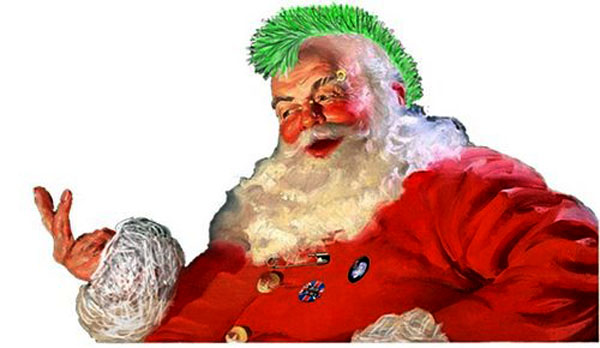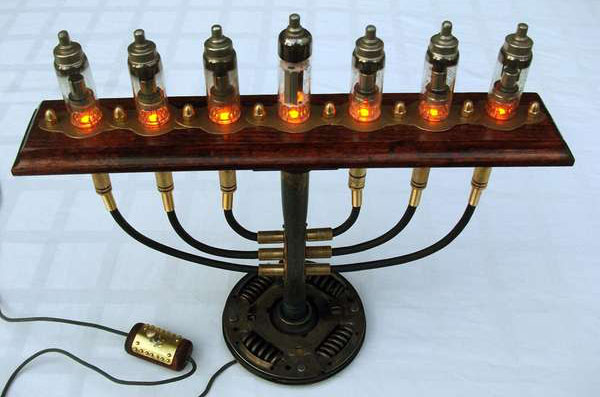Rockin’ the World: The Global Holiday Marathon
“I stopped believing in Santa Claus when I was six. Mother took me to see him in a department store and he asked for my autograph.”
-Shirly Temple, Halliwell’s Filmgoer’s Companion
“Daddy, is there really a Santa Claus?” My daughter—feet fidgeting in her Christmas PJs, eyes wide, gazed up at me with a mix of Cindy-loo Hoo innocence and Fox Molder persistence.
My pulse quickened as my stomach lurched. Just one more Santa Christmas, I thought to myself. Every year at Christmas I echo the lyrics of “Santa Claus” by the Sonics the inaugural song of the WPRB 24 Hour Holiday Marathon “Santa Claus where have you’ve been? I’ve been waiting to let you in!” But next year, I might wait in vain.
My daughter is only six years old, but Santa is already under siege. Could our Christmas live on with Santa dead? Dr. Helen M. Farrell notes that, when looking at the winter holidays—Christmas, Chanukah and beyond—“embracing family customs or personal rituals can be a powerful grounding force and a reminder that in an evolving world, some things are constant,” (Farrell, 2014). I feared my family was losing that constant. I turned to the wisdom of the 24 Hour Holiday Marathon—and its power to draw people from around the world. Much like those three kings of olde, I followed the star seeking hope, though more of a light on broadcast tower in Princeton, NJ than the divine light over Bethlehem.
(Accidental) Traditional Values
Jon Solomon has been at the helm of the Holiday Marathon for 26 years, and has seen how even an accidental tradition can become a universal “constant” in Dr. Farrell’s evolving world. “I did my first show in September of 1988 and I was eager to be on the air as much as possible,” Jon said in our very first interview.  “There was a huge swath of time available on Christmas Eve and I decided I would write my name in and stay on the air until the next DJ arrived. The next year I decided to go for the full 24 hours and an accidental tradition was born!” According to Jon, the tradition of the marathon, like Santa, has touched “every continent but Antarctica.”
“There was a huge swath of time available on Christmas Eve and I decided I would write my name in and stay on the air until the next DJ arrived. The next year I decided to go for the full 24 hours and an accidental tradition was born!” According to Jon, the tradition of the marathon, like Santa, has touched “every continent but Antarctica.”
The Marathon lives on because it combines both a now global family custom and a personal ritual for Jon. “I don’t think of my brother as a particularly religious person…but something that’s interesting about Jon is that he is very steadfast about the observance of some Jewish holiday rituals,” Debra, Jon’s sister from San Francisco said in the well regarded Family Marathon article from 2012. Jon agreed. “Ritual is very important to me, as are challenges and imposed limitations. That’s something people rarely consider about the Christmas show – there’s a pretty strict limitation on what can be played versus what can’t be played (all the other music in the world)” yet, people listen in nearly every culture.
On Christmas Eve, when “Christmas Markets, popular across central Europe, famous for their elaborate decorations, lights and shopping stalls” are ending their long holiday endeavor, Jon is just beginning his and perhaps the carolers have concluded their singing to tune in WPRB on a laptop. In Norway after an Eve of feasting and presents “all the brooms in the house are hidden” and maybe the tunes from 103.3 helps chase away “the holiday evil spirits” who would otherwise “come out and steal brooms from families and proceed to ride them around in the sky” (Rodman, 2013). On a street in Japan a youth may nod his head to Noah Vale (aka Bob Searles) classic theme to the Holiday Radio Show while digging in to their traditional Kentucky Fried Chicken—thanks to a 1975 advertising blitz—as his iPod streams on (Fox, 2013).
 There was a time when I hungered for that community. Christmas is my favorite time of the year, but that wasn’t the case when I was in High School. I would find any excuse to vacate the home on those Christmas mornings. After the presents were unwrapped, of course. I often felt like a bit of an outsider as a kid, though I had friends, and I would travel my vacant suburban streets listening to punk rock in an old Ford Escort with a plywood speaker box in the back. I’m not sure what I was looking for, aside from an escape. I found WPRB’s Holiday Radio Show.
There was a time when I hungered for that community. Christmas is my favorite time of the year, but that wasn’t the case when I was in High School. I would find any excuse to vacate the home on those Christmas mornings. After the presents were unwrapped, of course. I often felt like a bit of an outsider as a kid, though I had friends, and I would travel my vacant suburban streets listening to punk rock in an old Ford Escort with a plywood speaker box in the back. I’m not sure what I was looking for, aside from an escape. I found WPRB’s Holiday Radio Show.
I realize now, as a father and a Christian that I was looking to escape an emptiness. My mother could tell of how I threw “Then I guess there is no Santa Claus!” at her one year when she tried, gently, to dissuade me from my steadfast—and selfish—coveting of a Tandy computer for Christmas. She took the cue from my prideful eight-year-old self and decided to tell me the truth. Christmas was never the same; all I had believed in was Santa, and he was not real. I had waited in vain, I thought, and the world grew darker.
As my daughter looked up at me—with none of my pride or selfishness—I looked down at my eight-year-old self and the loss he had felt. In my desire for “One more Santa Christmas” I wonder, am I trying to protect her, or myself from the return of that darkness?
Together We Defy the Darkness
I learned that just as the Holiday Radio Show can be heard on every continent (except Antarctica) the struggle of light versus darkness can be found in almost every major winter tradition.
 Chanukah is called “The Festival of Light” due to the eight days that the one day supply of oil burned. Christmas celebrates how Jesus “the light of the world” was born. Some believe that the celebration of Jesus’ birth on December 25th is connected to the first Christian Roman emperor keeping the date and many customs of Saturnalia, the Roman solstice or the even earlier tradition of dies natalis solis invicti, ‘birthday of the unconquered sun’ but changing the focus. Even in Mongolia, which Jon said was “the most interesting recently [to] checked in” to the Marathon, they celebrate Tsagaan Sar, a morning gift-giving tradition that begins on the eve in a ceremony called “Bituun”, which means “full darkness” (thank you e-mongol, 2014). Though the Mongols who tuned into the Marathon were a few weeks early for Tsagaan Sar, the link is the same; the struggle of light to overcome darkness.
Chanukah is called “The Festival of Light” due to the eight days that the one day supply of oil burned. Christmas celebrates how Jesus “the light of the world” was born. Some believe that the celebration of Jesus’ birth on December 25th is connected to the first Christian Roman emperor keeping the date and many customs of Saturnalia, the Roman solstice or the even earlier tradition of dies natalis solis invicti, ‘birthday of the unconquered sun’ but changing the focus. Even in Mongolia, which Jon said was “the most interesting recently [to] checked in” to the Marathon, they celebrate Tsagaan Sar, a morning gift-giving tradition that begins on the eve in a ceremony called “Bituun”, which means “full darkness” (thank you e-mongol, 2014). Though the Mongols who tuned into the Marathon were a few weeks early for Tsagaan Sar, the link is the same; the struggle of light to overcome darkness.
“The acts themselves are less important than the predictable and comforting senses that each activity arouses,” Dr. Farrell (2014) said of our human need to fight the darkness with tradition. “These acts prompt a sense of nostalgia and make me feel more secure.” Courtney Bennett, from Newtown, PA and our classic Christmas Rock United article, said that she heard about the marathon in 1993 and thought “it seemed like a fun thing to listen to on Christmas Eve. Little did I know it would spark almost twenty years of arguing with my family about listening to ‘real’ Christmas music in the car.” Listen once, the Marathon is “a fun thing to listen to” listen twice, and we begin to build the “predictable and comforting” nostalgia of tradition.
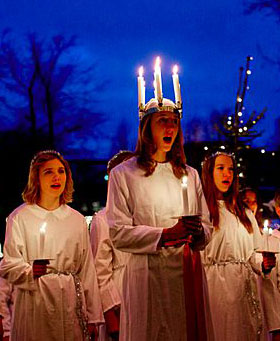 For me, the listening tradition began in my car, my old High School Chariot. Santa was gone, I was all hopped up on teenage angst and disillusion, and then I heard this music. It was an amazing synergy; Christmas and punk rock! Defiance and a degree of traditional conformity! A giant middle finger to the corporate hollowness that I thought must be the only real meaning of Christmas. It took years of spiritual journey before my true love and understanding of Christmas became what it is today, but the first spark was kindled there.
For me, the listening tradition began in my car, my old High School Chariot. Santa was gone, I was all hopped up on teenage angst and disillusion, and then I heard this music. It was an amazing synergy; Christmas and punk rock! Defiance and a degree of traditional conformity! A giant middle finger to the corporate hollowness that I thought must be the only real meaning of Christmas. It took years of spiritual journey before my true love and understanding of Christmas became what it is today, but the first spark was kindled there.
Listeners in Sweden and Denmark may be less connected to Ol’ Saint Nick than Saint Lucia who “brought light to the country during the dark winter days.” She is honored on Lucia Day with a “candlelit procession in which the chosen girls and boys dress in long white robes with red sashes and carry some variety of a candle. The girls typically wear a wreath of lit candles on their heads” (Rodman, 2013). Different Saint, same battle. My tradition of listening to the Marathon continues much the same; defying the darkness with light. It’s so punk, but it’s also so Christmas, so Lucia, so Chanukah, so Tagaan Sar.
United in Spirit
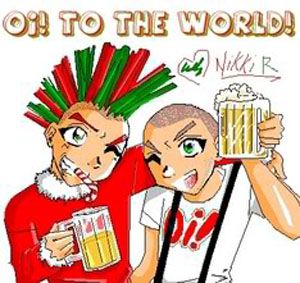 Jon Solomon would be the first to say that the Marathon has grown much bigger than just his efforts, but that is how traditions grow. “Positive emotions are essential for anyone to adapt in a healthy way to the changing world we live in,” says Dr. Farrell, and when something brings positive emotions during dark times, it draws others. Courtney “was just excited to find a subset of the music I liked that fit into the holiday time…there wasn’t a lot to play around Christmas time when you’re an indie rock/punk fan,” but for both of us that music became the light in the darkness.
Jon Solomon would be the first to say that the Marathon has grown much bigger than just his efforts, but that is how traditions grow. “Positive emotions are essential for anyone to adapt in a healthy way to the changing world we live in,” says Dr. Farrell, and when something brings positive emotions during dark times, it draws others. Courtney “was just excited to find a subset of the music I liked that fit into the holiday time…there wasn’t a lot to play around Christmas time when you’re an indie rock/punk fan,” but for both of us that music became the light in the darkness.
Now, the light of eclectic holiday music which first sparked in Jersey more than 25 years ago is spreading around the world transcending cultural variances. Jon said “a loyal group of Australians are always nice to hear from” though they decorate Pohutukawa trees instead of the classic pine that Ukrainian listeners adorn with spider webs, not tinsel. South African listeners munch on deep fried Emperor Moth caterpillars on Christmas Day while Jon begins to get sentimental and my family noshes kielbasa (Fox, 2013).
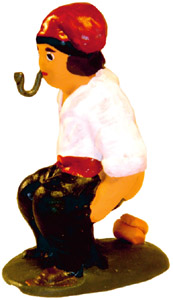 The Marathon is a tradition because it has, accidentally perhaps, struck a core of the human spirit at this time of year; the blend of defiance and community of those huddled around a light in the dark. The message is always, “come, share our fire, you are welcome here” and it will never be put better than Julia Factorial, “By listening you’re choosing real radio over every other offering on the dial…to hang with a real person instead of a computer generated playlist. By listening, you aren’t just blanking out on faux sentimentality…you’re choosing to hang where there’s a lot of genuine good feelings in the room, on the phone, in the instant messages, or emails or chatroom and webcam. There’s a real inclusiveness that brings people together from all over the Delaware Valley and across the world.”
The Marathon is a tradition because it has, accidentally perhaps, struck a core of the human spirit at this time of year; the blend of defiance and community of those huddled around a light in the dark. The message is always, “come, share our fire, you are welcome here” and it will never be put better than Julia Factorial, “By listening you’re choosing real radio over every other offering on the dial…to hang with a real person instead of a computer generated playlist. By listening, you aren’t just blanking out on faux sentimentality…you’re choosing to hang where there’s a lot of genuine good feelings in the room, on the phone, in the instant messages, or emails or chatroom and webcam. There’s a real inclusiveness that brings people together from all over the Delaware Valley and across the world.”
So, what will I tell my daughter? I will tell her the truth. My wife and already tell her that Christmas is more than Santa, and the Marathon proves that. No matter if your presents come on Chanukah, or because “It’s Jesus’ Birthday” or they’re delivered by Befana the friendly witch, like in Italy, these winter celebrations share the deeper spirit of welcome, warmth and giving. No matter if you have a Menorah in your home, a Nativity, or a Nativity featuring Caganer, a “small figure of a defecating man” (Fox, 2013)—as is common for listeners in Catalonia—the WPRB 24 Hour Holiday Marathon welcomes you, as it did me.
If you have never listened before, especially if you are in Antarctica, heed the words of Dr. Farrell “During these hectic times…it has never been more important to take a pause and rejuvenate the spirit. This is the time to embrace, start or continue tradition and celebrate!” Come rejuvenate your spirit. You are welcome to a share tradition that honors Chanukah, links countless cultural winter celebrations and unites those who may have once felt adrift at Christmas. You are welcome to the Marathon, where it doesn’t matter if Santa is alive or dead because the spirit of the Season lives on in bright, jovial defiance of the dark.
__________________________________________________
Farrell, H. (2014) Happiness and Tradition. Frontpage Forensics. Psychology Today. Retrieved from: http://www.psychologytoday.com/blog/frontpage-forensics/201408/happiness-and-tradition
Fox News (2013) Retrieved from: http://www.foxnews.com/travel/2013/12/24/35-weirdest-christmas-traditions-around-world/
Kristen Rodman (2013) 10 Christmas Traditions from Around the World. Accuweather. Retrieved from: http://www.accuweather.com/en/weather-news/10-christmas-traditions-from-a/20829734

